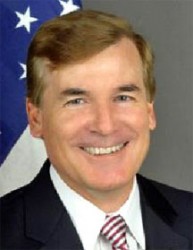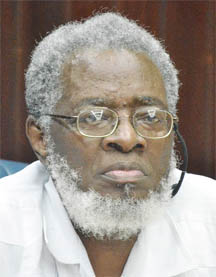The Alliance for Change yesterday restated its support for a US-funded democracy project that has sparked a withering attack by the government here on Washington’s Ambassador on the grounds that the country’s sovereignty has been challenged.
In a statement, the AFC said that any effort which enhances democracy will promote rather than undermine sovereignty.
Noting that there has been no local government election since 1994 and that the country is being run by a minority government in constant battle with the legislature, the AFC said “any effort which improves the participation of a broader cross section of the population in the decision making process of the country is not only welcomed but necessary”.

It added that the $300M Leadership and Democracy (LEAD) project was not only useful but necessary at a juncture when the country “totters on the brink of a minority authoritarianism”.
The AFC, which holds seven seats in Parliament expressed amusement at what it said was the “pretended alarm” by Head of the Presidential Secretariat, Dr Roger Luncheon who has led the attack on the US Ambassador, Brent Hardt. The AFC argued that the PPP government seems to have forgotten that it was its founder leader Dr Cheddi Jagan who insisted on the participation here of former US President Jimmy Carter in the quest for free and fair elections in 1992. The party said that it was therefore perplexed at what might have changed to cause efforts at boosting democracy to be suddenly considered as a challenge to sovereignty.
“…what could be the justification in not wanting to support a project as this which has increased participation of the citizenry in democracy building, consensus building in the National Assembly, funding for research and legal drafting skills for Parliamentarians, women and youth civic education festivals, and local government education and awareness? It could only be the downgrading of participatory democracy and the abandoning of a once loudly heralded PPP goal `No Development without Democracy’”, the AFC declared.
It said that the new-found approach of confrontational diplomacy and harsh assailing of Washington’s top diplomat here was a retrograde step.

“All Guyanese and perhaps equally importantly the members in the Guyanese Diaspora in the USA, must speak out against this unacceptable stance adopted by the government”, it asserted.
It added “AFC supports the position taken by the US government and looks forward to the positive contribution this project will provide to enhanced leadership and democracy in Guyana. The AFC endorses this project.”
The ire of the government was raised after Hardt told Stabroek News in an interview that the democracy project was going ahead despite the government’s objections. He also rejected Luncheon’s contention that the government was not consulted on the project. The embassy subsequently released a series of correspondence to show that the government had always been in the loop.
Prior to Hardt’s interview, the government had said that it was pulling out of the project and it expected that it would therefore no longer be proceeded with.
Since Hardt’s disclosure, the government has since written a formal protest note to the US State Department.
Luncheon on Tuesday said: “The note verbale is to the State Department. You don’t try Caesar in Caesar’s court. This note verbale goes to the State Department. It does not go to the Ambassador…he has to seriously consider what he is going to answer…what response. That is going to be seen as official US policy. Whatever they put in that note verbale in response to ours will be the US policy”.
Questioned on the aspects of the programme that the government found objectionable, he said that the issue of public support for political parties was one. He said that Guyana’s laws do not provide for state funding moreso foreign funding to political parties. “There is nothing like that in the law or in the practice. The Americans came into this project and invited what is a profoundly sensitive issue that has not been dealt with by this government or governments as far back as the day from Independence- public support for political parties. That, indeed, represented a usurpation of our authority,” he said.
The US Ambassador has maintained that there would be no funding to political parties under the project as it goes against state policy.
Luncheon said that another area of concern was that the project would support activities for the formulation of policies that may lead to constitutional reform. Said Luncheon: “We don’t amend the constitution that way. I don’t call in America to help us to amend the constitution and activities that address constitutionally important roles and activities obviously can become part and parcel.”
However when asked if these concerns were relayed to the project head he said that government maintains the right to accept or not accept a project without giving reasons. Observers have also pointed out that President Carter’s intervention here led to sweeping electoral reforms including the amending of the constitution to cater for a new elections commission. This had all been done with the full support of the PPP.
US embassy sources point out that the 2009 bilateral assistance agreement between Guyana and the US covers precisely the type of activities proposed through the LEAD programme.
The LEAD project covers a wide scope of activities from boosting citizens’ engagement with local parliamentarians and education on recently-passed local government reform legislation to assistance for parliamentarians in legislative research and drafting of laws.
The USAID-funded project is being implemented by the International Republican Institute (IRI) and emphasizes consultations with all stakeholders. “Through the course of the grant, the IRI will engage in regular consultations with government officials, party leaders, legislative staff, civil society organizations, and elections officials to advance this program,” the project document says.
In a letter in Wednesday’s edition of Stabroek News, Luncheon said:
“The Ambassador is playing with words with regards to consultation. I still contend Guyana was not consulted.
“The project was conceived by the American authorities. The project was funded by the US Congress.
“A bid was tendered, the US organisation, International Republican Institute, won that bid and was awarded the contract to implement the project.
“It was subsequent to those actions by the American authorities that the US Ambassador approached the Government of Guyana.
“I challenge the Ambassador to indicate at what point was the Government of Guyana consulted about this project.
“The US Ambassador presented the government with a fait accompli.”




